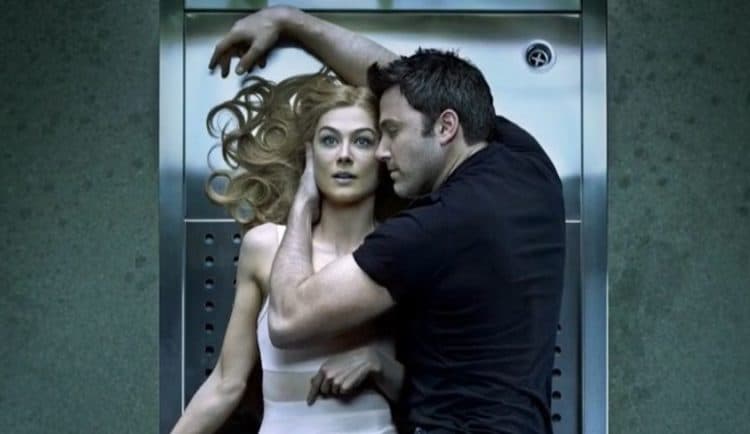
Gone Girl is a fascinating film. Looking back at the David Fincher pic that was adapted from Gillian Flynn’s novel (who also wrote the script), it centers around a successful and wealthy couple who seemingly have it all but are really living in a toxic relationship. Amy wants the perfect man and Nick showcased these traits before these two officially got married. Their little meet-cute at a party to their wild sex adventures in public places, the book author settled on a man that she believed could provide her with a lifetime of happiness. Of course, relationships are complicated and so are people. Nick doesn’t turn out to be the perfect husband that Amy wants him to be and instead of doing the rational thing that most couples do by seeking counseling or confronting Nick in an honest conversation about his promiscuous affairs, she did the next best solution: frame Nick for her murder.
Obviously, there’s a lot of tongue-in-cheek with Gone Girl as there’s a clear message in regard to marriage. Amy has a delusional mindset on the way marriage should work. Everyone wants a perfect marriage, but it’s not a simple black-and-white situation. Nick and Amy’s relationship represents the toxic ways that a marriage can go South. Nick is by no means an angel. He’s a smarmy douche for cheating on his wife. However, Amy is so fixated on how Nick shattered that image of the perfect life that she opts to ruin his. Both Amy and Nick use manipulation tactics to get one over another. Being the clever, but evil mastermind that she is, Amy is killing Nick thanks to media scrutiny. She’s painted Nick as this abusive and controlling man, and she’s the sweet angel trapped in a horrible marriage. She greatly understands how to trick the police into thinking that Nick is a horrible human being and uses her perfect image to drive the narrative in her direction.
We fast forward to the end where Nick makes a subtle plead for his wife to come home. And she does. Sure, she brutally murders Desi in order to shift the blame on him, but Amy comes home, and Nick is no longer seen as the villain. Amy ends up pregnant, though much to the dismay of Nick. He can’t divorce his wife because the likelihood of a judge granting him that request will be denied. The narrative is still very much in Amy’s favor as her having past notes in regard to Nick’s abusive behavior, plus the cheating scandal only further drives the court to dismiss his ruling entirely. Nick is forever trapped. Does that mean that the New York author deserves his miserable ending? Of course not! As I mentioned previously, Nick is a bit of a douche for cheating on his wife, but he doesn’t deserve a lifetime of unhappiness because he fails to live to the perfect husband moniker that Amy desperately wants.
However, Gone Girl isn’t about whether Nick deserves a happy life, it’s more of a dark cautionary tale about marriage. It’s kind of a “be careful what you wish for” type scenario. Granted, Nick never wishes for the perfect wife and happens to stumble upon a crazy person. He’s not happy with his marriage and clearly wants out. His actions are completely normal. However, it’s ingrained in Amy’s mind that Nick is the ONE that when he fails to meet that expectation then her only choice is to destroy his life. The saying, “If I can’t have him, no one can” works perfectly in scenario. Amy uses several things in her marriage to further trap Nick in her deceitful web. We already talked about how Nick simply can’t get a divorce, especially since Amy wouldn’t agree to it. Amy meticulously planning to lead up to framing Nick for her disappearance such as her husband not knowing about her secret life (which the cops chastise him for not knowing who his wife is) to unexpectedly signing a life insurance that would ultimately come back and haunt him. More importantly, it showcases that Amy is a scarred human being who has embedded a code that life must happen the way she wants it to be. On the outside, she seems like the perfect woman; however, Amy has been burned by love in the past and doesn’t want to end up alone. That’s why she’s willing deal with Nick. Not because he’s the only man that can love her, but because she’s afraid of loneliness. People are complex, and unfortunately, Nick is trapped in a situation that doesn’t have a happy ending. He doesn’t deserve his miserable ending, but at least Amy gets the perfect man that she’s been searching for.Gillian Flynn’s
 Follow Us
Follow Us





